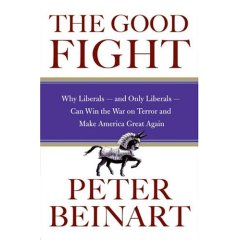Book Review: "The Good Fight: Why Liberals - And Only Liberals - Can Win the War on Terror and Make America Great Again" by Peter Beinart (2006)

I was going to wait for the paperback copy of this book to come out, which I figured would most likely come after this November's congressional elections, but I couldn't resist reading it now especially given how the pro-Iraq war Joe Lieberman has been unceremoniously kicked out of his party, despite voting with the Democrats over 90% of the time.
In "The Good Fight", Peter Beinart illustrates the challenges that the Democratic party has faced since the post-World War II era, through to Vietnam, the Clinton years and into the 2000s. Basically, for Beinart, this is a party that has historically struggled to come to grips with issues like anti-Communism, containment, and multilateralism abroad while struggling to define itself on issues like labour and civil rights at home. Although liberalism has not always been cohesive, for Beinart, where liberals differ from conservatives is that they don't think America is inherently and fundamentally good. In the liberal worldview, it's the checks on American power through bodies like the UN, and the demonstration of American values like liberty and equality through government action at home, that allow American prestige to be used to just ends abroad.
As for conservatism, the dominant worldview within that strain of American political thought, according to Beinart, is that America, by virtue of her very existence, is the beacon for people the world over who struggle under oppressive regimes. Therefore, the exercise of American power need not be subject to limits, and doing so would equate to self-doubt and contrition, two very unpatriotic and ultimately dangerous sentiments when fighting enemies such as the former Soviet Union, genocidal fanatics like Slobodan Milosevic or non-state enemies like al-Qaeda.
One is left to believe that Beinart argues for a Kennedy-esque approach to terrorism, although he doesn't ever really come out and say it. As Beinart recounts, Kennedy, as fiercely anti-Communist as they came, matched his eyeball-to-eyeball approach to Moscow with projects like the Peace Corps, which demonstrated the virture of American democratic culture throughout the world. This, combined with a commitment to the values of the New Deal at home, allowed for a consistent and idealistic yet tough policy against the enemy. This came in contrast to the students and others who comprised the 60s' radicals which ultimately came to dominate the party post-Johnson and would culminate in the disastrous McGovern campaign of 1972.
Beinart seems to acknowledge the impracticality of the radicals' approach but this book is more a history lesson than anything else. Only in the last chapter does he make an argument, tepid as it is, to recast liberalism in the Cold War tradition, one that asserted American military power abroad but was coupled with efforts like the Marshall Plan, which Harry Truman used to make allies out of former enemies. I don't think he's nearly hard enough on the elements in his party who seem hell-bent on ideological purity right now instead of providing an effective and pragmatic yet still-liberal response to the Bush White House's "damn the torpedoes" approach to foreign policy. Although Beinart espouses a mild form of moral relativism, the conspiracy theorists, America-haters and those who think Halliburton is more threatening to American security than radical Islam who now dominate liberalism get off with pretty much a free pass.
If Beinart and his friends wish to re-invigorate their party with the spirit of Cold War liberalism a la John F. Kennedy, they've first got to lose their fear of making enemies within their own camp, as many Democrats did in the Cold War era when the Communist element was pushed out and marginalized. It's an uphill struggle, no question, but absolutely vital if the foreign policy debate in America is to move beyond the Bush doctrine on the one hand and street protests with "No Blood for Oil" placards on the other.
(And who knew that Bobby Kennedy worked for Joseph McCarthy?)
Overall rating: 6.75/10

0 Comments:
Post a Comment
<< Home